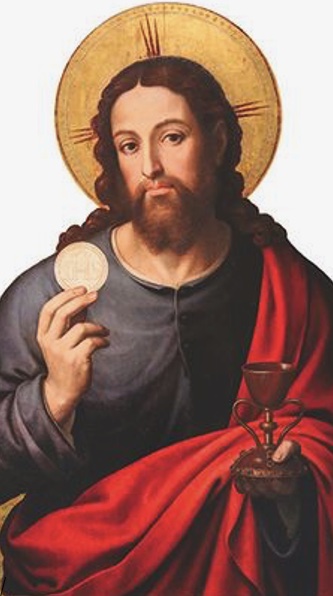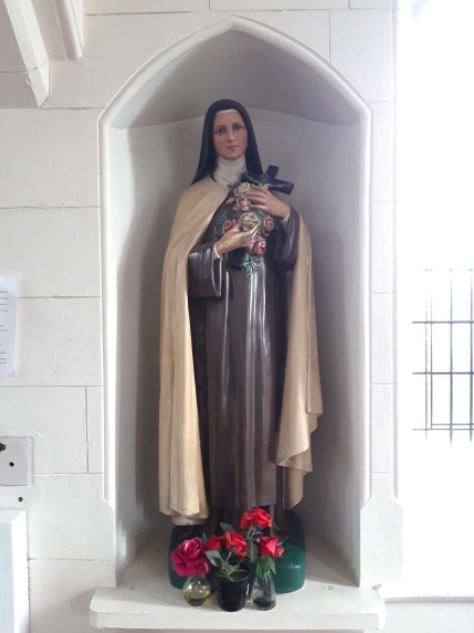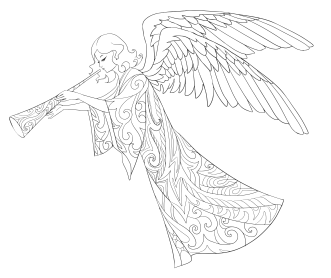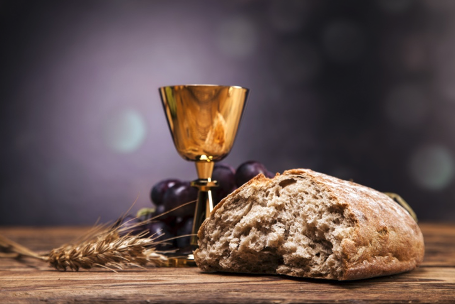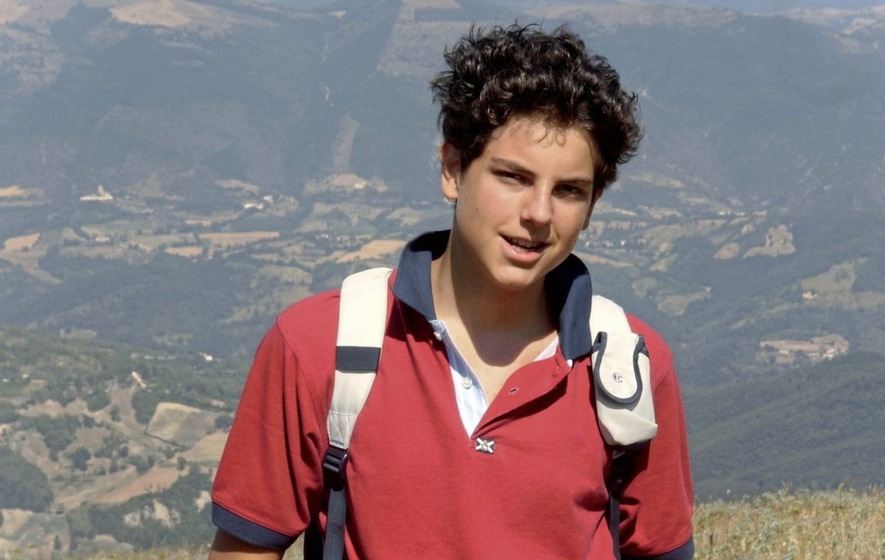The Sacrament of the Eucharist
The Eucharist is the source and summit of the Christian life. The other sacraments, and indeed all ecclesiastical ministries and works of the apostolate, are bound up with the Eucharist and are oriented toward it. For in the blessed Eucharist is contained the whole spiritual good of the Church, namely Christ himself.
By the consecration, the transubstantiation of the bread and wine, into the Body and Blood of Christ is brought about. Under the consecrated species of bread and wine Christ himself, living and glorious, is present in a true, real, and substantial manner: his Body and his Blood, with his soul and his divinity.
This is in clear agreement with what Jesus said: “I am the living bread that came down from heaven; if any one eats of this bread, he will live for ever; . . . he who eats my flesh and drinks my blood has eternal life and . . . abides in me, and I in him.” (Jn 6:51, 54, 56)
The holy Eucharist completes Christian initiation. Those who have been raised to the dignity of the royal priesthood by Baptism and configured more deeply to Christ by Confirmation participate with the whole community in the Lord’s own sacrifice by means of the Eucharist.
(Information taken from the Catechism of the Catholic Church)
The Fruits of Holy Communion
Holy Communion augments our union with Christ. The principal fruit of receiving the Eucharist in Holy Communion is an intimate union with Christ Jesus. Indeed, the Lord said: “He who eats my flesh and drinks my blood abides in me, and I in him.” Life in Christ has its foundation in the Eucharistic banquet: “As the living Father sent me, and I live because of the Father, so he who eats me will live because of me.”
What material food produces in our bodily life, Holy Communion wonderfully achieves in our spiritual life. Communion with the flesh of the risen Christ, a flesh “given life and giving life through the Holy Spirit,” preserves, increases, and renews the life of grace received at Baptism.
Holy Communion separates us from sin. The body of Christ we receive in Holy Communion is “given up for us,” and the blood we drink “shed for the many for the forgiveness of sins.” For this reason the Eucharist cannot unite us to Christ without at the same time cleansing us from past sins and preserving us from future sins:
St. Ambrose sums this up well, “For as often as we eat this bread and drink the cup, we proclaim the death of the Lord. If we proclaim the Lord’s death, we proclaim the forgiveness of sins. If, as often as his blood is poured out, it is poured for the forgiveness of sins, I should always receive it, so that it may always forgive my sins. Because I always sin, I should always have a remedy.”
As bodily nourishment restores lost strength, so the Eucharist strengthens our charity, which tends to be weakened in daily life.
By the same charity that it enkindles in us, the Eucharist preserves us from future mortal sins. The more we share the life of Christ and progress in his friendship, the more difficult it is to break away from him by mortal sin.
The Eucharist commits us to the poor. To receive in truth the Body and Blood of Christ given up for us, we must recognise Christ in the poorest, his brethren.
St. Thomas Aquinas, “The actual effect of the Eucharist is the transformation of man into God.”
St. Thérèse of Lisieux on her first Holy Communion
Ah! How sweet was that first kiss of Jesus! It was a kiss of love; I felt, that I was loved and I said: “I love you and I give myself to you forever!” There were no demands made, no struggles, no sacrifices; for a long time now Jesus and poor little Thérèse looked at and understood each other. That day, it was no longer simply a look, it was a fusion; they were no longer two, Thérèse had vanished as a drop of water is lost in the immensity of the ocean. Jesus alone remained; He was the Master, the King. Had not Thérèse asked Him to take away her liberty, for her liberty frightened her? She felt so feeble and fragile that she wanted to be united forever to the Divine Strength!
The Bread of the Angels
Psalm 78:25 speaks about “the bread of the angels,” referring to the life-sustaining manna in the wilderness. The Eucharist has been described as “the bread of angels that angels cannot receive.” Our guardian angels look upon us as we receive Communion and experience a holy envy of us. Imagine, then, the great sadness of the guardian angel of a person who approaches the altar to receive Communion in a routine and devotionless way, who is concerned only with hurrying home to watch TV or read the paper. The angel might ask, “How could this person be so apathetic about receiving God whom the universe cannot contain? How can this person be so oblivious and unresponsive to the tremendous power to change their lives-through God’s healing power? If I were receiving Communion, how differently would I react?”
St. John Vianney, “God would have given us something greater if he had something greater than himself.”
The Eucharist- Jesus, the Bread of Life
Among the ancient warring Anglo-Saxons, guarding the food supply was an important assignment. Since bread was the primary staple food at that time, this task essentially meant guarding the bread supply. Because the Anglo-Saxons constantly feared that the enemy would steal their bread supply and cause starvation, someone was always responsible for guarding it.
It is worthwhile examining some etymology here. In early English, the person in charge of this critical assignment for the survival of the community was called a halfweard; this word referred to the trusted “loafward” for the community. In time the term was contracted to hlaford. By the Middle Ages, the word had first evolved to laferd and then loverd. Finally, in later English, the word was reduced to the similar word lord, and was the expression used to refer to the master of the household supplies, especially the bread supplies. This word was further ennobled as the English translation of the Latin word dominus. The root for this word is domus, meaning “household” or “house” in Latin. In Roman culture, the dominus, or lord, was a position of prestige related to controlling the household’s food supply, the mainstay of which was bread.
It is certainly more providential than coincidental that Jesus acknowledged for himself the title Lord: “You call me ‘Teacher’ and ‘Lord,’ and rightly so, for that is what I am” (Jn 13:13). As we have already seen, etymologically the lord or “master of the household” was the keeper of the bread supply. Jesus referred to himself with the phrase “master of the household supplies” or “food provider,” reflecting the origins of the word lord in the parable recorded in Matthew 24:45-51: “Who then is the faithful and wise servant, whom the master [of the household] has put in charge of the servants in this household to give them their food at the proper time?” And he again appropriated this title for himself in Matthew 10:25: “If they have called the master of the household Beelzebul, how much more those of this household!”
Upon further investigation, we uncover even more interesting little details that seem far from coincidental. Was it coincidental that Jesus-this “master of the household,” this “master of the food supplies”- was born in Bethlehem, which means House of Bread? Coincidental that Jesus, who would later call himself the Bread of Life, was laid in a manger, a box designed to hold food for the livestock in the stable? Coincidental that the word manger comes from the Latin mandere, meaning ‘to chew’?
Eucharistic Miracles
The ‘digital holiness’ teenager Carlo Acutis was beatified by Pope Francis on 10th October 2020. Carlo was also fascinated by the Eucharist, and created a website cataloguing Eucharistic miracles from all over the world. This website can be viewed here: http://www.miracolieucaristici.org/en/Liste/list.html
In an interview with Catholic news agency EWTN, his mother, Antonia Salzano, said he could teach today’s young people how to properly use and enjoy technology, including the internet and social media.
“Because he understood that they were potentially very harmful, very dangerous, he wanted to be the master of these means, not a slave,” she said. Her son “imposed on himself a maximum of one hour per week to use these means of communication.” This example would teach young people to “understand the need to maintain the proper autonomy and the need to be always able to say, ‘No, enough’, to not become a slave.
“My life plan is always to be connected to Jesus.” With these few words, Carlo Acutis, who died of leukaemia when he was only fifteen years old outlined the distinctive features of his brief existence: living with Jesus, for Jesus, and in Jesus. To quote Carlo’s own words: “Our destination must be what is infinite, not what is finite. Infinity is our homeland. We have been expected in heaven since time immemorial.” He also said, “All are born with their own originality, but many die as photocopies.”
Eucharistic Miracle of Buenos Aires 1996
One of the most recent and astounding miracles happened in 1996. You can understand the details of this miracle here-


